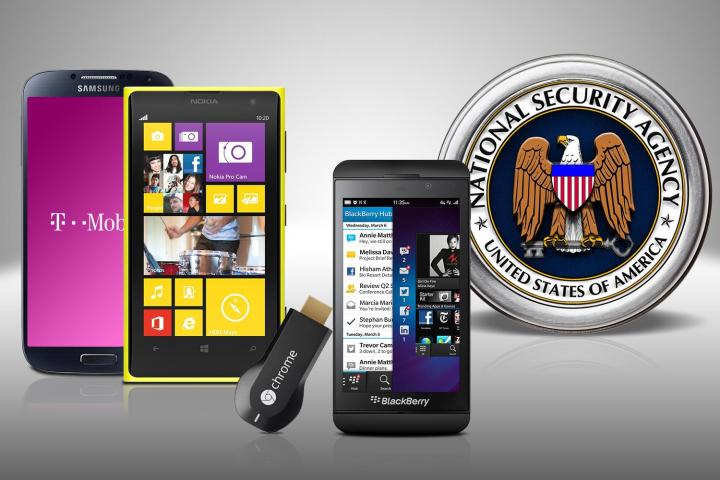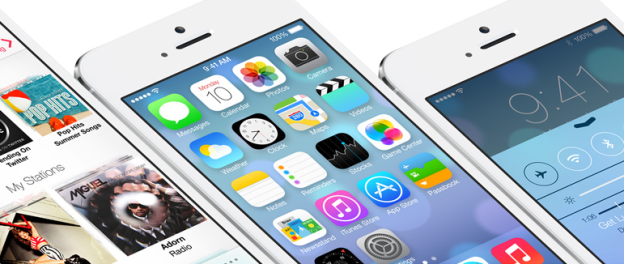
As 2013 draws to a close, we thought we’d cast an eye back over the last 12 months in mobile. A lot can, and did, happen in 365 days. We’ve seen successes and failures; we’ve borne witness to exciting new releases and disastrous flops. So, who won and lost? What impressed us and what disappointed? What mobile stories will 2013 be remembered for? Grab yourself a stiff drink, find a warm chair, and join us as we delve into the highs and lows of the past 8765 hours.
NSA is uncontrollably spying on everyone
After all that fuss about the Chinese spying on us it turns out that the NSA was engaged in a massive spying mission the whole time. An interesting defense suggested that the surveillance was only about metadata, so instead of actually listening in to your calls, the NSA is just studying who you call, when you call them, and how long the call lasts, then who you call next, who they call next, and on and on. All of which feeds into the same kind of big data predictive analytics that advertisers are engaging in to target us better, none of which is really very reassuring.
T-Mobile is the Uncarrier
It was deepest, darkest January, and 2013 was still in its infancy when T-Mobile’s new CEO, John Legere, took to the CES stage and unveiled the carrier’s plan to beat the competition by ditching the standard two-year contract system for smartphones. He may be crazy, but his network has drastically improved over the last year, and throughout 2013 T-Mobile systematically launched new services, giving users free international roaming and tablet Internet access, among other things. The “uncarrier” is now a tempting enough proposition that many people (including our very own mobile editor) are making the switch to T-Mobile, attracted by clarity and fairer pricing. Stranger still, T-Mobile’s moves have made a big enough impact that the other major carriers have tried to copy it, leading to a fairer way to buy phones all around.
Unlocking your smartphone is legal, no wait it’s illegal
It was exempted back in 2006, but at the end of 2012 the Librarian of Congress decided that unlocking smartphones should be illegal. This new law came into effect at the end of January to the sound of carriers cheering and rubbing their hands with glee and a big fat “meh” from the general public. A few months later we found out that no one listens to the law – phone unlocking actually increased since becoming illegal. It makes sense, though. It’s not like anyone served time for unlocking their phone. Just this month, the major carriers finally saw sense and agreed to let everyone unlock their cell phones again.
BlackBerry circles the RIM

A bright start to the year saw the rebranded BlackBerry finally launch the delayed BB10 platform on the Z10 handset. It looked good, if not great, and it seemed like there was a chance the company would turn things around. Then news turned south. Sales of the Z10 were disappointing and exacerbated by the unpopular Q10. Things got so bad that BlackBerry’s board put it up for sale at the end of the summer. CEO Thorsten Heins walked away amidst a failed takeover in November, and the future remains far from clear. The company will probably survive in some form, but we wouldn’t buy a BlackBerry right now.
Windows Phone finally claims third
Analysts have been predicting that Microsoft’s platform would claim third place in the market and grow into a real competitor for the big two, Android and iOS, for a long time now. They were proved half right this year as Windows Phone finally wrestled that third spot away from BlackBerry. We can’t pretend that BlackBerry’s horrible fall from grace isn’t part of the reason, but it’s worth noting that Windows Phone is not stealing people away from Android or iOS. According to Kantar World Panel it’s sucking in a lot of first time smartphone buyers. If we look at IDC stats, the 3.6 percent share Windows Phone claimed in the third quarter is still less than the 4.1 percent share that BlackBerry had in that same quarter a year ago, but things are looking up for Windows Phone.
Microsoft buys Nokia
The slow climb in market share for Windows Phone was due to one company and that company was Nokia. By August Nokia was responsible for 85 percent of the Windows Phone market. Microsoft completely failed to tempt other manufacturers to commit to its platform in a major way; in fact, it had to pay Nokia handsomely to do so. What was the next step, amid countless suggestions that Nokia should branch out and jump on the Android bandwagon? Microsoft bought Nokia’s phone assets outright for $7.2 billion. Will this be a good thing for Microsoft’s mobile pretensions? It’s very hard to say, but Microsoft fans seeking good news need look no further than Ballmer’s departure. 2014 could be a very big year for the company.
Googorola comes good

Expectations were high when Google splurged $12.5 billion to acquire Motorola Mobility, but that pipeline had to be drained before the Moto X could ride into town and start raising hell. It may have taken longer than expected for the partnership to result in a new smartphone, but the Moto X caused plenty of excitement when it finally arrived. It also signaled a renewed commitment from Google to improve Android by doing more than just bumping specs ever higher. The always listening voice commands and the level of customization on offer, helped differentiate the Moto X from the flagship pack. A few months later and the bargain of the year popped out in the shape of the Moto G. If there were any lingering doubts about Google’s determination to make Android work at every price point, or that Motorola had changed its premium smartphone spots, these phones disproved them.
Bending those screens
Flexible display technology has been talked about for a while now, and various manufacturers have shown off prototypes, but Samsung and LG took the first steps this year toward a wave of new devices with flexible plastic displays. The LG G Flex and Samsung Galaxy Round look gimmicky at first glance. The benefits of the curve are unclear, but beyond increased durability, this technology will lead to new innovative form factors in the months and years to come. The LG G Flex is also a great phablet.
Apple’s iOS 7 and new line

A radical redesign of Apple’s all-conquering mobile platform saw Jony Ive put iOS’s staple skeuomorphism to death. The new bright, colorful look had a polarizing effect on the fan base and generated way more controversy than it should have, but on the whole it looks to have been a success. The product line-up was the usual update: the iPad got thinner with the iPad Air, Apple delivered the Retina display everyone wanted in the iPad Mini 2, and the iPhone 5S and 5C gently shook up the smartphone scene. The long rumored budget iPhone still didn’t make an appearance (told you so). Highlights include the fingerprint sensor on the 5S, which is not the first of its kind, but in typical Apple style is done much better than anything before it. It could pave the way for more biometrics in smartphones as it hits that sweet spot between security and convenience.
Samsung is unstoppable
South Korean manufacturer Samsung shrugged off underdog status a long time ago, and now it is absolutely crushing the competition. Hardly a week passed in mobile during 2013 where Samsung didn’t release something. The headlining Galaxy S4 spawned a series of spin-offs, the Note 3 hit a new high for phablets, and Samsung released a tidal wave of smartphones and tablets in every conceivable market bracket, not to mention the Galaxy Gear smartwatch. It also continued to attack Apple as part of a huge marketing campaign, but the law suits that made headlines in 2012 are still raging in courtrooms across the globe and Samsung is mostly losing them. It’s interesting to see Samsung doing so well in the market, while critics pick on a lack of real innovation in the iterative improvements to its flagship line, and bemoan the company’s growing arrogance. Remind you of anyone?
Sony tries again
The reinvented Sony (minus the Ericsson) kicked off an exciting year with the Xperia Z and followed it up with one of the best Android tablets to date, the Xperia Tablet Z. The Z Ultra wasn’t as impressive, but the Z1 refresh was welcome and it shows that Sony is trying to make inroads in the market, although the bad news is that it’s focusing on Europe and Japan, for now.
LG in the ascendancy
Another manufacturer making waves in the Android market is LG. It was chosen to manufacture Google’s latest smartphone, the Nexus 5, and it really impressed us with the LG G2 and LG G Pad 8.3. It moved into fourth place in the global mobile phone manufacturer charts and it could be set to rise further if it can keep up the momentum.
Google’s KitKat and Chromecast

We saw the usual refresh of the Nexus line-up with the Nexus 5 and the new Nexus 7, although the updated Nexus 10 is now overdue, but that’s not where the excitement was with Google this year. We’ve already discussed the Motorola releases, while driverless cars and robotics divisions are beyond the scope of this piece. A new Android release is always news, but this one was overshadowed by the KitKat cross promotion deal with Nestle. Putting all that aside, an innocuous device that looks like a USB drive signaled Google’s bid for your television, and Chromecast has a real shot at domination. All the mobile players want to lock you into their expanding ecosystems and Chromecast is arguably the most successful attempt to do that in 2013. More apps and an international roll out could reveal just how important this small, inexpensive release could be for Google.
It is safe to make inflight calls
Everyone laboring under the misapprehension that the plane might tumble from the sky if you were to turn on your smartphone to make a call and interfere with its instruments realized how stupid that idea was when the topic popped up for debate again this year. Turns out that they’ve been banned for 22 years largely because of bureaucracy – and maybe because airlines knew it would be really annoying if the person next to you in this giant metal flying tube kept yammering into their cell phone for several hours. The FCC is taking steps to lift the ban, but can we really trust people to have inflight manners? You thought air travel couldn’t get any more annoying, prepare to revise that opinion.
The future
Mobile technology is constantly evolving and you never know what the next big thing will be. There are plenty more smartwatches on the way, we’ll see Google Glass and many competitors hit the market in 2014 (we think), and 4K displays and modular phones could be set to make a splash. Whatever the big news stories are in mobile in 2014, you can rely on DT to report them.

